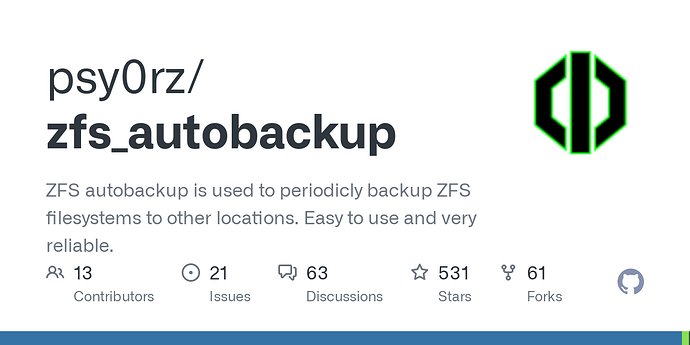Below a list of all errors that I’m getting on the target side in the TrueNAS GUI after replicating zfs snapshots with zfs-autobackup of a dataset that is mounted on both source and target server.
I suspect this is because zfs-autobackup doesn’t “properly” mount the target dataset, because after a reboot (where TrueNAS does the mounting itself), there are no errors…
[EFAULT] Failed retreiving USER quotas for master-pool/encrypted-ds/test-ds
Error: concurrent.futures.process._RemoteTraceback:
"""
Traceback (most recent call last):
File "/usr/lib/python3/dist-packages/middlewared/plugins/zfs_/dataset_quota.py", line 76, in get_quota
with libzfs.ZFS() as zfs:
File "libzfs.pyx", line 529, in libzfs.ZFS.__exit__
File "/usr/lib/python3/dist-packages/middlewared/plugins/zfs_/dataset_quota.py", line 78, in get_quota
quotas = resource.userspace(quota_props)
^^^^^^^^^^^^^^^^^^^^^^^^^^^^^^^
File "libzfs.pyx", line 3651, in libzfs.ZFSResource.userspace
libzfs.ZFSException: cannot get used/quota for master-pool/encrypted-ds/test-ds: unsupported version or feature
During handling of the above exception, another exception occurred:
Traceback (most recent call last):
File "/usr/lib/python3.11/concurrent/futures/process.py", line 256, in _process_worker
r = call_item.fn(*call_item.args, **call_item.kwargs)
^^^^^^^^^^^^^^^^^^^^^^^^^^^^^^^^^^^^^^^^^^^^^^^^^
File "/usr/lib/python3/dist-packages/middlewared/worker.py", line 112, in main_worker
res = MIDDLEWARE._run(*call_args)
^^^^^^^^^^^^^^^^^^^^^^^^^^^
File "/usr/lib/python3/dist-packages/middlewared/worker.py", line 46, in _run
return self._call(name, serviceobj, methodobj, args, job=job)
^^^^^^^^^^^^^^^^^^^^^^^^^^^^^^^^^^^^^^^^^^^^^^^^^^^^^^
File "/usr/lib/python3/dist-packages/middlewared/worker.py", line 34, in _call
with Client(f'ws+unix://{MIDDLEWARE_RUN_DIR}/middlewared-internal.sock', py_exceptions=True) as c:
File "/usr/lib/python3/dist-packages/middlewared/worker.py", line 40, in _call
return methodobj(*params)
^^^^^^^^^^^^^^^^^^
File "/usr/lib/python3/dist-packages/middlewared/plugins/zfs_/dataset_quota.py", line 80, in get_quota
raise CallError(f'Failed retreiving {quota_type} quotas for {ds}')
middlewared.service_exception.CallError: [EFAULT] Failed retreiving USER quotas for master-pool/encrypted-ds/test-ds
"""
The above exception was the direct cause of the following exception:
Traceback (most recent call last):
File "/usr/lib/python3/dist-packages/middlewared/main.py", line 198, in call_method
result = await self.middleware.call_with_audit(message['method'], serviceobj, methodobj, params, self)
^^^^^^^^^^^^^^^^^^^^^^^^^^^^^^^^^^^^^^^^^^^^^^^^^^^^^^^^^^^^^^^^^^^^^^^^^^^^^^^^^^^^^^^^^^^^^
File "/usr/lib/python3/dist-packages/middlewared/main.py", line 1466, in call_with_audit
result = await self._call(method, serviceobj, methodobj, params, app=app,
^^^^^^^^^^^^^^^^^^^^^^^^^^^^^^^^^^^^^^^^^^^^^^^^^^^^^^^^^^^^^^^^
File "/usr/lib/python3/dist-packages/middlewared/main.py", line 1417, in _call
return await methodobj(*prepared_call.args)
^^^^^^^^^^^^^^^^^^^^^^^^^^^^^^^^^^^^
File "/usr/lib/python3/dist-packages/middlewared/schema/processor.py", line 187, in nf
return await func(*args, **kwargs)
^^^^^^^^^^^^^^^^^^^^^^^^^^^
File "/usr/lib/python3/dist-packages/middlewared/plugins/pool_/dataset_quota_and_perms.py", line 225, in get_quota
quota_list = await self.middleware.call(
^^^^^^^^^^^^^^^^^^^^^^^^^^^
File "/usr/lib/python3/dist-packages/middlewared/main.py", line 1564, in call
return await self._call(
^^^^^^^^^^^^^^^^^
File "/usr/lib/python3/dist-packages/middlewared/main.py", line 1425, in _call
return await self._call_worker(name, *prepared_call.args)
^^^^^^^^^^^^^^^^^^^^^^^^^^^^^^^^^^^^^^^^^^^^^^^^^^
File "/usr/lib/python3/dist-packages/middlewared/main.py", line 1431, in _call_worker
return await self.run_in_proc(main_worker, name, args, job)
^^^^^^^^^^^^^^^^^^^^^^^^^^^^^^^^^^^^^^^^^^^^^^^^^^^^
File "/usr/lib/python3/dist-packages/middlewared/main.py", line 1337, in run_in_proc
return await self.run_in_executor(self.__procpool, method, *args, **kwargs)
^^^^^^^^^^^^^^^^^^^^^^^^^^^^^^^^^^^^^^^^^^^^^^^^^^^^^^^^^^^^^^^^^^^^
File "/usr/lib/python3/dist-packages/middlewared/main.py", line 1321, in run_in_executor
return await loop.run_in_executor(pool, functools.partial(method, *args, **kwargs))
^^^^^^^^^^^^^^^^^^^^^^^^^^^^^^^^^^^^^^^^^^^^^^^^^^^^^^^^^^^^^^^^^^^^^^^^^^^^
middlewared.service_exception.CallError: [EFAULT] Failed retreiving USER quotas for master-pool/encrypted-ds/test-ds
[EFAULT] Failed retreiving GROUP quotas for master-pool/encrypted-ds/test-ds
Error: concurrent.futures.process._RemoteTraceback:
"""
Traceback (most recent call last):
File "/usr/lib/python3/dist-packages/middlewared/plugins/zfs_/dataset_quota.py", line 76, in get_quota
with libzfs.ZFS() as zfs:
File "libzfs.pyx", line 529, in libzfs.ZFS.__exit__
File "/usr/lib/python3/dist-packages/middlewared/plugins/zfs_/dataset_quota.py", line 78, in get_quota
quotas = resource.userspace(quota_props)
^^^^^^^^^^^^^^^^^^^^^^^^^^^^^^^
File "libzfs.pyx", line 3651, in libzfs.ZFSResource.userspace
libzfs.ZFSException: cannot get used/quota for master-pool/encrypted-ds/test-ds: dataset is busy
During handling of the above exception, another exception occurred:
Traceback (most recent call last):
File "/usr/lib/python3.11/concurrent/futures/process.py", line 256, in _process_worker
r = call_item.fn(*call_item.args, **call_item.kwargs)
^^^^^^^^^^^^^^^^^^^^^^^^^^^^^^^^^^^^^^^^^^^^^^^^^
File "/usr/lib/python3/dist-packages/middlewared/worker.py", line 112, in main_worker
res = MIDDLEWARE._run(*call_args)
^^^^^^^^^^^^^^^^^^^^^^^^^^^
File "/usr/lib/python3/dist-packages/middlewared/worker.py", line 46, in _run
return self._call(name, serviceobj, methodobj, args, job=job)
^^^^^^^^^^^^^^^^^^^^^^^^^^^^^^^^^^^^^^^^^^^^^^^^^^^^^^
File "/usr/lib/python3/dist-packages/middlewared/worker.py", line 34, in _call
with Client(f'ws+unix://{MIDDLEWARE_RUN_DIR}/middlewared-internal.sock', py_exceptions=True) as c:
File "/usr/lib/python3/dist-packages/middlewared/worker.py", line 40, in _call
return methodobj(*params)
^^^^^^^^^^^^^^^^^^
File "/usr/lib/python3/dist-packages/middlewared/plugins/zfs_/dataset_quota.py", line 80, in get_quota
raise CallError(f'Failed retreiving {quota_type} quotas for {ds}')
middlewared.service_exception.CallError: [EFAULT] Failed retreiving GROUP quotas for master-pool/encrypted-ds/test-ds
"""
The above exception was the direct cause of the following exception:
Traceback (most recent call last):
File "/usr/lib/python3/dist-packages/middlewared/main.py", line 198, in call_method
result = await self.middleware.call_with_audit(message['method'], serviceobj, methodobj, params, self)
^^^^^^^^^^^^^^^^^^^^^^^^^^^^^^^^^^^^^^^^^^^^^^^^^^^^^^^^^^^^^^^^^^^^^^^^^^^^^^^^^^^^^^^^^^^^^
File "/usr/lib/python3/dist-packages/middlewared/main.py", line 1466, in call_with_audit
result = await self._call(method, serviceobj, methodobj, params, app=app,
^^^^^^^^^^^^^^^^^^^^^^^^^^^^^^^^^^^^^^^^^^^^^^^^^^^^^^^^^^^^^^^^
File "/usr/lib/python3/dist-packages/middlewared/main.py", line 1417, in _call
return await methodobj(*prepared_call.args)
^^^^^^^^^^^^^^^^^^^^^^^^^^^^^^^^^^^^
File "/usr/lib/python3/dist-packages/middlewared/schema/processor.py", line 187, in nf
return await func(*args, **kwargs)
^^^^^^^^^^^^^^^^^^^^^^^^^^^
File "/usr/lib/python3/dist-packages/middlewared/plugins/pool_/dataset_quota_and_perms.py", line 225, in get_quota
quota_list = await self.middleware.call(
^^^^^^^^^^^^^^^^^^^^^^^^^^^
File "/usr/lib/python3/dist-packages/middlewared/main.py", line 1564, in call
return await self._call(
^^^^^^^^^^^^^^^^^
File "/usr/lib/python3/dist-packages/middlewared/main.py", line 1425, in _call
return await self._call_worker(name, *prepared_call.args)
^^^^^^^^^^^^^^^^^^^^^^^^^^^^^^^^^^^^^^^^^^^^^^^^^^
File "/usr/lib/python3/dist-packages/middlewared/main.py", line 1431, in _call_worker
return await self.run_in_proc(main_worker, name, args, job)
^^^^^^^^^^^^^^^^^^^^^^^^^^^^^^^^^^^^^^^^^^^^^^^^^^^^
File "/usr/lib/python3/dist-packages/middlewared/main.py", line 1337, in run_in_proc
return await self.run_in_executor(self.__procpool, method, *args, **kwargs)
^^^^^^^^^^^^^^^^^^^^^^^^^^^^^^^^^^^^^^^^^^^^^^^^^^^^^^^^^^^^^^^^^^^^
File "/usr/lib/python3/dist-packages/middlewared/main.py", line 1321, in run_in_executor
return await loop.run_in_executor(pool, functools.partial(method, *args, **kwargs))
^^^^^^^^^^^^^^^^^^^^^^^^^^^^^^^^^^^^^^^^^^^^^^^^^^^^^^^^^^^^^^^^^^^^^^^^^^^^
middlewared.service_exception.CallError: [EFAULT] Failed retreiving GROUP quotas for master-pool/encrypted-ds/test-ds
[ENOENT] Path /mnt/master-pool/encrypted-ds/test-ds not found
Error: Traceback (most recent call last):
File "/usr/lib/python3/dist-packages/middlewared/main.py", line 198, in call_method
result = await self.middleware.call_with_audit(message['method'], serviceobj, methodobj, params, self)
^^^^^^^^^^^^^^^^^^^^^^^^^^^^^^^^^^^^^^^^^^^^^^^^^^^^^^^^^^^^^^^^^^^^^^^^^^^^^^^^^^^^^^^^^^^^^
File "/usr/lib/python3/dist-packages/middlewared/main.py", line 1466, in call_with_audit
result = await self._call(method, serviceobj, methodobj, params, app=app,
^^^^^^^^^^^^^^^^^^^^^^^^^^^^^^^^^^^^^^^^^^^^^^^^^^^^^^^^^^^^^^^^
File "/usr/lib/python3/dist-packages/middlewared/main.py", line 1428, in _call
return await self.run_in_executor(prepared_call.executor, methodobj, *prepared_call.args)
^^^^^^^^^^^^^^^^^^^^^^^^^^^^^^^^^^^^^^^^^^^^^^^^^^^^^^^^^^^^^^^^^^^^^^^^^^^^^^^^^^
File "/usr/lib/python3/dist-packages/middlewared/main.py", line 1321, in run_in_executor
return await loop.run_in_executor(pool, functools.partial(method, *args, **kwargs))
^^^^^^^^^^^^^^^^^^^^^^^^^^^^^^^^^^^^^^^^^^^^^^^^^^^^^^^^^^^^^^^^^^^^^^^^^^^^
File "/usr/lib/python3.11/concurrent/futures/thread.py", line 58, in run
result = self.fn(*self.args, **self.kwargs)
^^^^^^^^^^^^^^^^^^^^^^^^^^^^^^^^^^
File "/usr/lib/python3/dist-packages/middlewared/schema/processor.py", line 191, in nf
return func(*args, **kwargs)
^^^^^^^^^^^^^^^^^^^^^
File "/usr/lib/python3/dist-packages/middlewared/schema/processor.py", line 53, in nf
res = f(*args, **kwargs)
^^^^^^^^^^^^^^^^^^
File "/usr/lib/python3/dist-packages/middlewared/plugins/filesystem.py", line 422, in stat
raise CallError(f'Path {_path} not found', errno.ENOENT)
middlewared.service_exception.CallError: [ENOENT] Path /mnt/master-pool/encrypted-ds/test-ds not found
Is there perhaps a way to force TrueNAS to remount a specific (or all) datasets from the command line?

